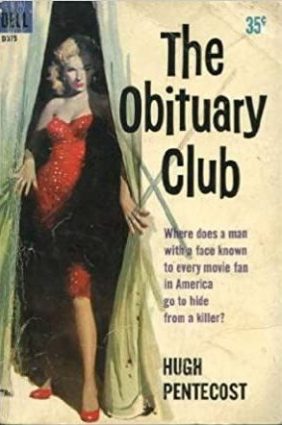 Charles Seeley was one of the greatest comic actors of all time, with only Chaplin and Fields above him in the Hall of Fame, but he was not a pleasant man to know. His life was full of playing practical jokes on people – and not whoppee cushions but cruel, nasty jokes, played upon the rich and famous. And despite being dead, he has one last joke to play.
Charles Seeley was one of the greatest comic actors of all time, with only Chaplin and Fields above him in the Hall of Fame, but he was not a pleasant man to know. His life was full of playing practical jokes on people – and not whoppee cushions but cruel, nasty jokes, played upon the rich and famous. And despite being dead, he has one last joke to play.
Seven people, the so-called Obituary Club, were tied together by the chance of obtaining Seeley’s fortune, but it will only become available when one of them dies – and then only to one member of the Club. And when that death occurs, newspaper columnist Grant Simon finds himself in a race against time to protect Larry Baldwin, a famous actor from someone who is trying to kill him.
OK, see if you can get this right. You have a massive legacy, so you pick seven people who you vaguely owe something to. They are all assigned a number from 1 to 7 (which nobody else knows) and all have a different number in an envelope (also from 1 to 7) that they keep secret. Then when one of them dies, their number is revealed and the person with that number in their envelope inherits your fortune. Only in a mystery novel… of course, without knowing who has which number, what motive would one have for killing another? Unless they somehow knew who had what number…
I was sent this as a thank you by Kate Jackson, she of Cross Examing Crime, Pocket Detective and Coffee & Crime fame. I think she figured I hadn’t heard of Hugh Pentecost – she was quite right.
Pentecost was the pseudonym of Judson Philips, with, according to Wikipedia, seven series detectives. Oddly, Grant Simon isn’t apparently the series character here, it’s police lieutenant Pascal, who has a reasonably sized role here, but Simon is clearly the sleuth – he even has his own Watson narrating it.
There is, however, not that much detection going here, with most of the book chasing round trying to find out where Baldwin is hiding from whoever is trying to kill him and chasing after an obviously not-the-mastermind hitman. While Pentecost has gone overboard in setting the problem for the sleuths with the ridiculous will, he does take the easiest possible way out with the explanation.
To be honest, I found this a bit lacking, but it was primarily the plot veering all over the place rather than the style of writing, and I’d be willing to give Pentecost another try, especially if someone were to recommend a title to me. So thanks again to Kate for putting another author on my radar.

I recently read my first Pentecost: Shadow of Madness and found it a riveting read, so would recommend it. Here’s my review of it:
https://ahotcupofpleasureagain.wordpress.com/2020/05/29/fridays-forgotten-book-shadow-of-madness-by-hugh-pentecost-1950/
LikeLike
Spelling error. Third paragraph, end of sentence two – two should be to.
LikeLike
Thanks
LikeLike
I enjoyed both The 24th Horse (https://myreadersblock.blogspot.com/2017/01/the-24th-horse-review.html) and Where the Snow Was Red (https://myreadersblock.blogspot.com/2019/02/where-snow-was-red-review.html)–giving both four stars out of five
LikeLike
Thanks, Bev
LikeLike
I generally like Pentecost’s/Judson’s writings. They tend to have more action and melodrama than the average puzzle mystery, and I enjoy them on their own terms. They are characteristic of a style common in U.S. mystery novels at the time: decent but not spectacular puzzles, a concentration on social observations, and a ramping up of danger toward the protagonist or other major character with whom the reader is encouraged to identify. The Pierre Chambrun series and Peter Styles series are both appealing. I also recommend the novella “The Day the Children Vanished.” I concur with the recommendation of Shadow of Madness, and I recommend the other stories about John Smith, most of which are novellas, I think. Finally, may I recommend a book by another Pentecost series character I like: The Battles of Jericho, published by Crippen & Landru with an introduction by yours truly?
LikeLike
Love the plug just casually slipped in at the end.
Unfortunately the C & L title isn’t on ebook, and they’re not cheap to get on these shores, but there are a few affordable titles out there that I’ve got my eye on – mostly not the recommended series though. I’ll see what I can get my hands on and report back…
LikeLike